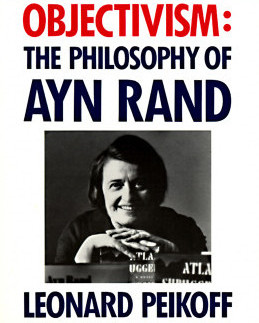The following passages are excerpted from Leonard Peikoff’s Objectivism: The Philosophy of Ayn Rand. The excerpts — which range from such abstract issues as the nature of universals to more concrete issues like sex — provide a fascinating glimpse into the breadth, depth, and clarity of Leonard Peikoff’s Objectivism: The Philosophy of Ayn Rand.
What Philosophy is, and How to Study It
Philosophy is not a bauble of the intellect, but a power from which no man can abstain. Anyone can say that he dispenses with a view of reality, knowledge, the good, but no one can implement this credo. The reason is that man, by his nature as a conceptual being, cannot function at all without some form of philosophy to serve as his guide…
The fact that a man’s sex life is shaped by his conclusions and value-judgments is evident in every aspect. It is evident in the setting he prefers, the state of dress, the caresses, positions, and practices, and the kind of partner. This last is particularly eloquent…
…This brings me to another topic: to an alleged opposite of statism that, in fact, entails it. I mean anarchism…
“Capitalism,” in Ayn Rand’s definition, “is a social system based on the recognition of individual rights, including property rights, in which all property is privately owned.” This is a definition in terms of fundamentals and not of consequences…
The “profit motive,” speaking broadly, means a man’s incentive to work in order to gain something for himself — in economic terms, to make money. By Objectivist standards, such a motive, being thoroughly just, is profoundly moral…
We are often told that love (like the pursuit of truth) is selfless…
…At this stage, I want merely to dissociate Ayn Rand’s approach from the subjectivist idea of dealing with others. Egoism, in the Objectivist interpretation, does not mean the policy of violating the rights, moral or political, of others in order to satisfy one’s own needs or desires. It does not mean the policy of a brute, a con man, or a beggar…
…Many people in our Kantian era think, mistakenly, that absolutism is incompatible with a contextual approach to knowledge. These people define an “absolute” as a principle independent of any other fact or cognition; i.e., as something unaffected by anything else in reality or in human knowledge…
The moral justification for capitalism is not the “Public Good”
…The moral justification of capitalism is not that it serves the public. Capitalism does achieve the “public good” (appropriately defined), but this is an effect, not a cause; it is a secondary consequence, not an evaluative primary…
The arbitrary as neither true nor false
An arbitrary claim is one for which there is no evidence, either perceptual or conceptual. It is a brazen assertion, based neither on direct observation nor on any attempted logical inference therefrom. For example, a man tells you that the soul survives the death of the body; or that your fate will be determined by your birth on the cusp of Capricorn and Aquarius…
Emotions are states of consciousness with bodily accompaniments and with spiritual — intellectual — causes…
Validation of free-will (volition)
How, then, do we know that man has volition? It is…
The solution to the problem of universals
The answer to the “problem of universals” lies in Ayn Rand’s discovery of the relationship between universals and mathematics. Specifically, the answer lies in the brilliant comparison she draws between concept-formation and algebra…
There is no question more crucial to man than the question: what is man? What kind of being is he? What are his essential attributes? Many thinkers and artists have sought to answer this question. They have looked at men and then offered a report on man’s nature. Their reports have clashed through the ages…
Altruism on principle is suicide
Those who reject the principle of selfishness will find in the history of ethics two main alternatives. One is the primordial and medieval theory that man should sacrifice himself to the supernatural. The second is the theory that man should sacrifice himself for the sake of other men. The second is known as “altruism,” which is not a synonym for kindness, generosity, or good will, but the doctrine that man should place others above self as the fundamental rule of life…
